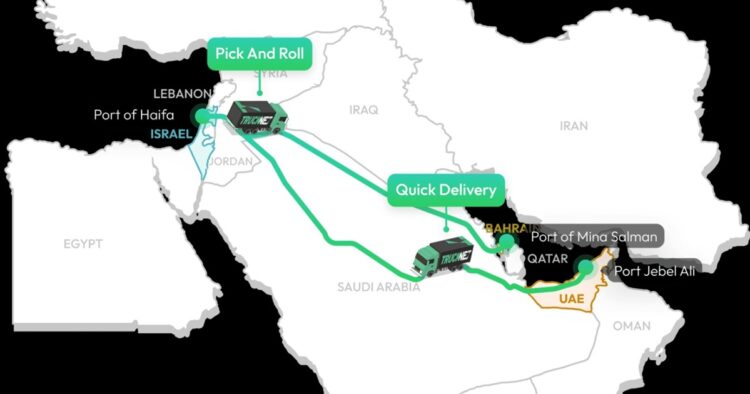In a bid to secure trade routes amidst heightened tensions and attacks on sea routes, a land corridor for cargo delivery between the Gulf states, Israel, and now extended to Egypt has been established. This strategic move comes as an alternative to sea routes facing threats during the ongoing conflict with Hamas in Gaza. The ground route, initiated earlier this year during U.S.-brokered Saudi-Israel normalization talks, gained momentum due to increased attacks on commercial vessels in the Red Sea by Iranian-backed Houthi rebels from Yemen.
Strengthening Economic Ties Through the Abraham Accords
The expansion of this land corridor reflects the economic and historic breakthrough facilitated by the 2020 Abraham Accords, where Israel made peace with four Arab countries, including the United Arab Emirates and Bahrain. The U.S.-backed transportation project aims to enhance economic and trade cooperation between Arab nations and Israel, presenting a united front against common challenges, often referred to as the ‘axis of evil.’
Economic and Historic Breakthrough
Hanan Fridman, founder and president of Trucknet Enterprise, emphasized that the latest accord signed on Sunday is not intended to replace the Suez Canal sea route but to offer an alternative during times of attacks and complement it during peacetime for expedited delivery. The land route significantly reduces both time and costs, with a 14-day sea journey shortened to just four days overland, even before the recent conflict.
Utilizing Land Connectivity Amidst Ongoing Conflict
Even before the outbreak of the war triggered by Hamas’s attack on Israel, the “Land Connectivity by Trucks” project facilitated cargo transport between the Gulf of Dubai and Israel’s Haifa Port. The project was launched discreetly as talks were underway for normalization between Saudi Arabia and Israel, hinting at the potential for a landmark peace accord. The recent increase in the use of the land route is attributed to the Houthi attacks on the sea route, forcing Israeli vessels to reroute via South Africa, resulting in delays and increased transportation costs.
A New Middle East and Future Plans
The success of the Abraham Accords is hailed as a catalyst for creating a new Middle East. Haifa Port is positioned to become a major hub for international trade connectivity. Looking ahead, there are discussions about a long-term plan involving the creation of a rail link between Israel and the Gulf states through Saudi Arabia. This ambitious project would contribute to a larger train initiative linking Israel, the Gulf, Europe, and the East, further shaping the economic landscape of the region.

















Comments